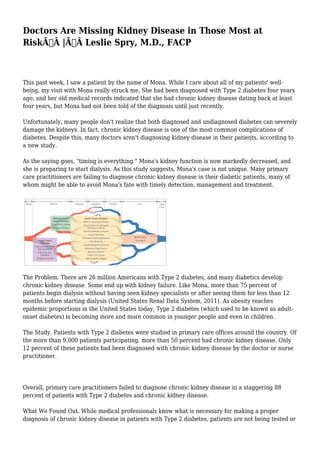
Doctors Are Missing Kidney Disease in Those Most at Risk | Leslie Spry, M.D., FACP
- 1. Doctors Are Missing Kidney Disease in Those Most at Risk | Leslie Spry, M.D., FACP This past week, I saw a patient by the name of Mona. While I care about all of my patients' well-being, my visit with Mona really struck me. She had been diagnosed with Type 2 diabetes four years ago, and her old medical records indicated that she had chronic kidney disease dating back at least four years, but Mona had not been told of the diagnosis until just recently. Unfortunately, many people don't realize that both diagnosed and undiagnosed diabetes can severely damage the kidneys. In fact, chronic kidney disease is one of the most common complications of diabetes. Despite this, many doctors aren't diagnosing kidney disease in their patients, according to a new study. As the saying goes, "timing is everything." Mona's kidney function is now markedly decreased, and she is preparing to start dialysis. As this study suggests, Mona's case is not unique. Many primary care practitioners are failing to diagnose chronic kidney disease in their diabetic patients, many of whom might be able to avoid Mona's fate with timely detection, management and treatment. The Problem. There are 26 million Americans with Type 2 diabetes, and many diabetics develop chronic kidney disease. Some end up with kidney failure. Like Mona, more than 75 percent of patients begin dialysis without having seen kidney specialists or after seeing them for less than 12 months before starting dialysis (United States Renal Data System, 2011). As obesity reaches epidemic proportions in the United States today, Type 2 diabetes (which used to be known as adult-onset diabetes) is becoming more and more common in younger people and even in children. The Study. Patients with Type 2 diabetes were studied in primary care offices around the country. Of the more than 9,000 patients participating, more than 50 percent had chronic kidney disease. Only 12 percent of these patients had been diagnosed with chronic kidney disease by the doctor or nurse practitioner. Overall, primary care practitioners failed to diagnose chronic kidney disease in a staggering 88 percent of patients with Type 2 diabetes and chronic kidney disease. What We Found Out. While medical professionals know what is necessary for making a proper diagnosis of chronic kidney disease in patients with Type 2 diabetes, patients are not being tested or
- 2. diagnosed with chronic kidney disease. More than 50 percent of the patients in the study had not had a urine protein test done, and 15 percent of patients had not had a blood test for kidney function in the past 15 months. The reasons behind these numbers are not clear, but one thing is for sure: If you're a patient with these conditions, you should speak up. What Tests Should You Ask For? Looking back, Mona now realizes she could have requested two simple tests that check whether the kidneys are working properly. A simple blood test can measure how the kidneys are functioning and is known as the estimated glomerular filtration rate (eGFR). Urine tests that measure the amount of protein, or albumin in the urine, are also important in detecting early stages of CKD. Abnormal amounts of albumin are often found in the urine of patients with chronic kidney disease. The eGFR requires that blood be drawn so that it can be used to calculate the kidney function number. If eGFR is over 90, the kidneys are healthy and functioning normally. A kidney score of 60 means the person should be monitored, and if GFR scores falls to less than 60 for a three-month period, that is an indicator of chronic kidney disease. When I saw Mona for the very first time, her eGFR was 16. The Lesson. If you have Type 2 diabetes, you should be screened every year for chronic kidney disease. The National Kidney Foundation and the American Diabetes Association both recommend annual screening for chronic kidney disease in all persons with Type 2 diabetes. Before your yearly physical, write a note to yourself to ask your primary care physician or nurse practitioner to do this testing. The National Kidney Foundation also provides free screening for those with diabetes, through its Kidney Early Evaluation Program (KEEP). You can go to the NKF website and learn where and when there is a free screening event near you. If Diagnosed. Once you have a diagnosis of CKD caused by Type 2 diabetes, there are known treatments that may halt or delay its progression. Medications such as Angiotensin Converting Enzyme (ACE) inhibitors and Angiotensin Receptor Blockers (ARBs) are used to treat chronic kidney disease. Careful control of your diabetes will also help protect your kidneys. You will also be referred to a kidney specialist. The best way to avoid complications of both chronic kidney disease and Type 2 diabetes is when a kidney specialist works together with your primary care physician or nurse practitioner. For more information about diabetic kidney disease, visit the National Kidney Foundation's web site. I want to hear from you... Do you have diabetes? Did your doctor test for kidney disease? Please share your story in the comment box below. For more by Leslie Spry, M.D., FACP, click here. For more on personal health, click here.